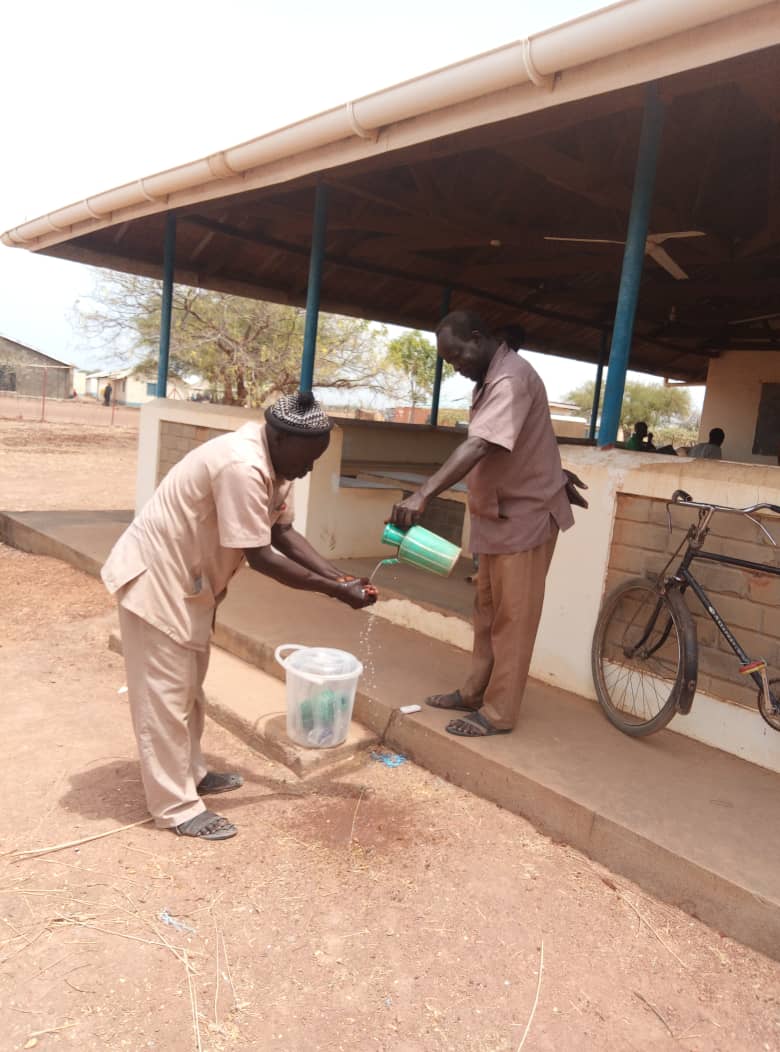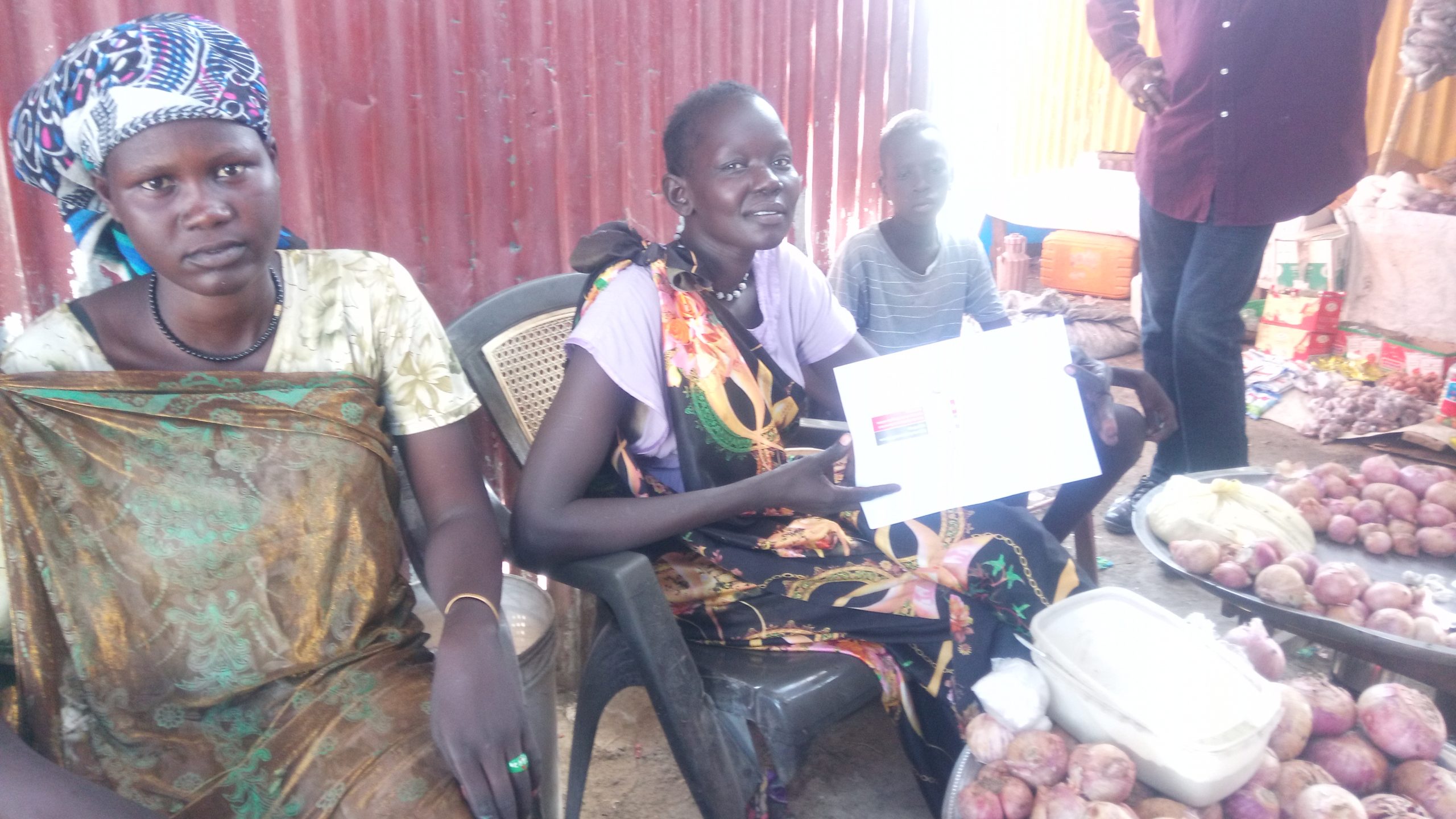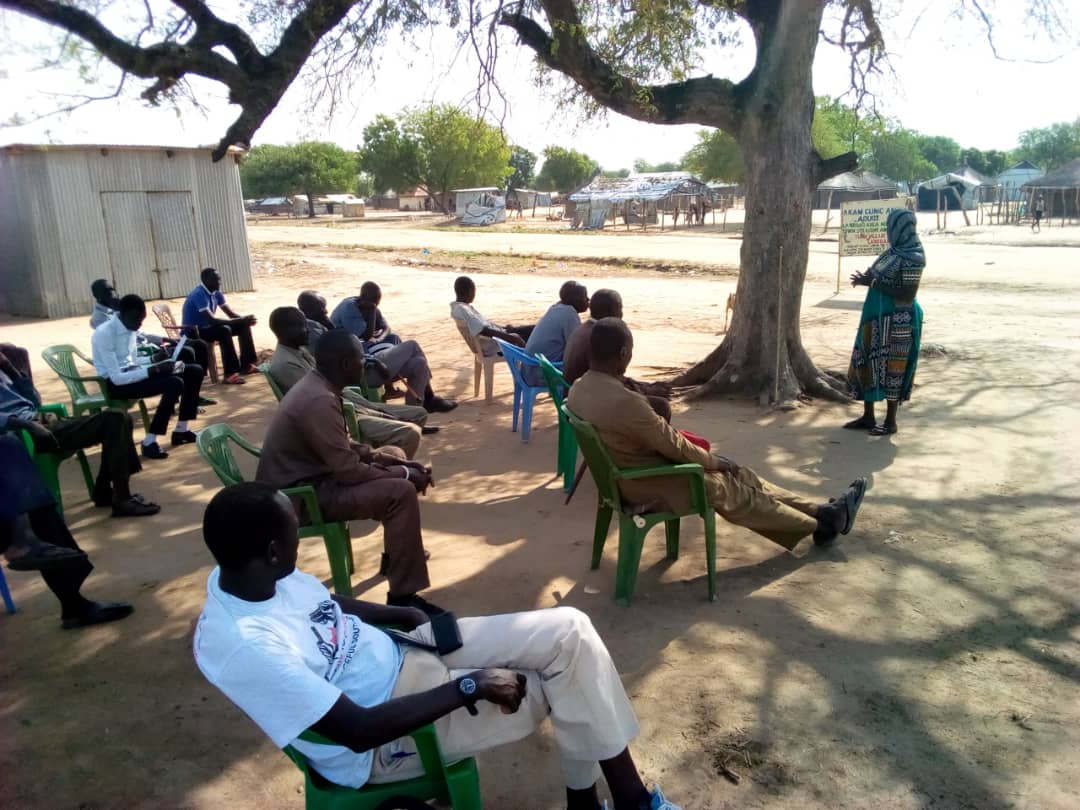By Mimi Kuer Bior
In April 2020, when COVID-19 reached South Sudan, many of RVI’s South Sudanese researchers decided to return to their hometowns to avoid what they believed would be a large outbreak in the country’s capital, Juba. Following discussions with friends and family, the researchers proposed that RVI work with them to conduct a programme of messaging and awareness-raising on COVID-19.1 These activities would draw on the strong network of chiefs established during the five years of RVI’s South Sudan Customary Authorities project. The customary authorities project, and the work on public health messaging around COVID-19, were both made possible by generous funding from the Swiss government.
In preparation, RVI staff liaised with Health Pooled Fund in South Sudan to obtain accurate information about the disease that could passed on to communities. This was translated into local languages by the Summer Institute of Languages. RVI researchers also supported translation efforts, for example by translating material into Lotuko and Dongotono—two languages spoken in Eastern Equatoria. Researchers were provided with the most up-to-date guidelines from WHO and coordinated their work with local actors to ensure their efforts were complemented by other stakeholders.
Work with chiefs and local medical professionals was focused on developing ways in which public health messages could be effectively communicated to communities. One way this was done was by organizing chiefs and medical professionals to appear on local radio stations. Chiefs also used traditional institutions, including their own courts, to amplify the public health messages, as well as speaking to people in the market, door-to-door or on boda bodas (motorbike taxis) with a loudspeaker. At the same time, the researchers distributed hand washing stations in selected locations. A summary of the work carried out in the seven different locations is below.
Aweil

Joseph Diing Majok and Santino Garang Akot returned home to Aweil and started their programme of community messaging with a radio show on Akok Yam FM, a station with coverage across the whole of Norther Bahr el-Ghazal and parts of Warrap. The church radio station, Weer-bei FM in Malual Kon, also broadcast explanations of preventative measures to communities in local languages. Chief Abakar Salathin helped identify the traditional courts that needed assistance with messaging and support with hand washing stations. The team conducted messaging at the Traditional Authorities Centre in Gokmachar, at Nyamlel Paramount Chief Court in Aweil East and in Wanjok with Chief Peter Makuac and Madhol with Chief Lual Malong.
In Aweil North and West, it was still possible, although illegal, to cross over the border into Sudan. With confirmed COVID-19 cases then surging in Sudan, borderland communities were judged as being at greater risk of transmission due to the influx of people arriving each day from South Darfur. In response, efforts were made to help provide these communities with information and advice on preventative measures to mitigate the risk of COVID-19 via returnees from Sudan.
Meanwhile, national and international NGOs recruited young volunteers to move door-to-door and attend social gatherings, restaurants and clubs to deliver WHO guidelines. Local churches also joined in sharing preventative measures, although many rural churches were still open on Sundays despite the directives from South Sudan’s High-Level Task Force.
Yirol
In Yirol, RVI researchers Machot Amuom and Mou Abraham began their COVID-19 awareness campaign by appearing on a community radio show with a live call-in for the general public. RVI also invited Dr Marial Cuir, director general of the state ministry of health, Chief Kon Mayor and Chief Akech Agok to take part in the discussion. The talk show was the first public and official briefing about COVID-19 in Yirol. Responses to the show were positive, and the radio station used key recorded messages for further awareness in the community.
During the radio show, Dr Marial acknowledged the limited capacity of the state in terms of staff, testing kits, protective gowns and admission facilitates. Chief Kon echoed the COVID-19 preventative measures outlined by Dr Marial and the seriousness of the disease, reiterating that cultural events and practices, including marriages, should cease during the crisis. Chief Kon reminded people of the traditional practices already used in times of contagious disease outbreaks and urged them to remember these during this time.
Chief Akech called on the public to be resilient, not to panic and to stay home or on their remote farms in order to avoid public places. He recalled past experiences of disease, including whooping cough in the 1970s and the restricted movement that was enforced at the time.
After the success of the radio show, the researchers travelled to Mayen Mager, Aluakluak and nearby cattle camps, markets and auction centres—places with limited access to information due to poor mobile and radio networks. Communities within these villages and camps rely heavily on messages and guidance from chiefs, sub-chiefs, herdsmen and village heads.
Mayom and Bentiu
Mawal Marko Gatkouth conducted sensitization with chiefs and elders in Mayom, however, he found that many traditional beliefs held in these communities made it very difficult for people to adhere to preventative measures. Many of the elders explained that their spiritual leaders (beny-bith) had already made sacrifices to their gods and ancestors and they were therefore not concerned about the pandemics and its effects.

Chiefs in Mayom continue with their routine duties, which include solving community problems in groups and in close proximity. Some elders raised concerns such as lack of water, hand sanitizer, soap and adequate food supplies to fully quarantine themselves should they develop symptoms. Other questions also arose around social distancing within a single homestead and how to distinguish between COVID-19 and other diseases with similar symptoms.
Bor
Researcher Abraham Diing conducted COVID-19 messaging across a number of communities in Bor, including Kapaat, Anyidii, Konbeek and Mading. Abraham selected one chief and one youth representative from each of the locations to attend an initial briefing on the planned activities and rationale.

During the meetings, the team explained what COVID-19 is, its symptoms, modes of infection, preventive measures and the fact that there is currently no known cure. The briefing was also an opportunity to discuss and dismiss conspiracy theories around the virus, including the belief that it is spread by the UN, is a tool for population reduction, a money-making ploy, that it does not affect people living in hot climates, is a disease confined to elderly white people and that it can be treated with malaria medication or by drinking tea without sugar. The team also participated in a 45-minute talk show on Jonglei Radio.
In Kappat constituency, the meeting was attended by a pastor from the church, two community elders, one women’s representative, one chief and one youth representative. The pastor had requested that the discussion be recorded so that he could replay it to his church congregation. The chief urged community members to protect themselves, particularly to avoid handshakes, not sit closely together or share utensils. He asked people to practice social distancing and to wash their hands frequently with soap and water.
There was limited information on COVID-19 across the communities and people were particularly happy to hear their chiefs talk about the pandemic in their own language. RVI researchers were told that most of the information initially broadcast on radio was communicated in English, which isolated much of the population.
Torit, Ikotos and Isoke
From April to June, researcher Ohide Johnson Paul conducted community messaging across villages in Torit, Ikotos and Isoke in Eastern Equatoria. In May, messaging took place in Isoke and covered ten smaller villages, including Imme, Lorum, Iketek, Lolingaru, Kuruma and Loronyo. Ohide worked with two chiefs who noted that this was the first time that their role has been recognized during the pandemic.
While many of the activities conducted and topics discussed were the same as previously mentioned, a number of new challenges were noted. For example, many of the communities seemed unwilling to avoid handshakes as advised, and many homesteads could not afford to install washing facilities within their compound. Funerals continued and many chiefs were challenged for wearing protective masks when other community members were going without. Ohide also noted an alarming increase in the number of teenage pregnancies in Eastern Equatoria since schools have been closed as a preventative measure.
Leer and Mayendit
Researcher James Gatkuoth Mut Gai conducted messaging in Mayendit and Leer Counties, targeting traditional head chiefs, cattle camp headman, women’s groups and church elders. Due to its remote rural location, many of the chiefs and elders expressed concerns about the virus being brought into the community by travellers and migrants from affected areas. Communities in Leer and Mayendit specifically called on the High-Level Task Force to help them cope with the challenges of COVID-19. One chief said: ‘Our people in Juba need to be in Juba, we will meet them after COVID-19 has been officially finished in South Sudan. Because those in Juba are well off, they have all facilities equipped with laboratories for screening and treating patients’.
Notes
1. The researchers on the project were Joseph Diing Majok, Santino Garang Akot, Gatkuoth Mut Gai, Abraham Diing Akoi Nyuon, Abraham Mou Magok, Machot Amuom Malou, Ohide Johnson Atom and Mawal Marko Gatkuoth.



